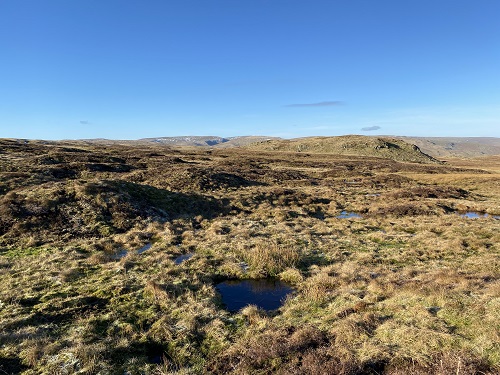
Climate Solutions for Cumbrian Landscapes: Peatlands
Peatlands store more carbon than all the world's other vegetation types combined.
As terrestrial wetland ecosystems, waterlogged conditions prevent plant material from fully decomposing, meaning that over time peatlands slowly build deep accumulations of organic materials. So they're critical for preventing and mitigating the effects of climate change, preserving biodiversity, minimising flood risk, and ensuring safe drinking water.
Here in Cumbria’s cool and wet climate, it’s been estimated that there are >88,000 hectares of peatland soils. Therefore peatlands will play a vital role in Cumbria achieving the overall goal of net zero by 2037.
However peatlands are also incredibly vulnerable to damage. Scientists estimate that 15% of global peatlands have been drained for alternative uses such as land development, forestry and agriculture. This has resulted in significant greenhouse gas emissions, releasing the carbon that those wetlands had been storing for millennia.
A recent study by Cumbria Wildlife Trust found that >95% of County Wildlife Site wetlands surveyed were in poor management condition.
Peatland restoration is a vital and cost-effective way to help limit climate change, substantially reducing emissions. Restoration techniques can include blocking up drainage ditches, rewetting, and replanting with sphagnum mosses that help form new layers of peat and trap moisture.
In today’s event we’ll learn about the science of blanket peatlands, their significance to reducing Cumbria’s emissions, and examples of practical projects already acting to protect this vital resource.
Our expert contributors will include the University of Cumbria, North Pennines AONB, and the Zero Carbon Cumbria Partnership.
There’ll also be opportunities for questions and discussion.
This events is part of the Climate Solutions for Cumbrian Landscapes programme
This webinar on peatland supports work by the Zero Carbon Cumbria Partnership on land use. It's part of an on-going events programme focused on environmental challenges and solutions across different types of Cumbrian landscapes.
Our next event will be focused on Rivers (8th February), we'll then look at Hedgerows (14th March).
Image: peat bunding restoration on Shap Fells (credit Jack Brennand / University of Cumbria)
MORE INFORMATION
Website: Zero Carbon Cumbria Partnership
Cost - This event is free to attend.
Venue - This event will be held via Zoom. Once you register, you'll receive a link to join the event.
Recording - We may record the event to share online afterwards. By taking part in this event, you accept that your name/image/voice may appear in the recording. You can opt not to activate your webcam and microphone, and you can change how your name is displayed in the list of participants. Attendees' video feeds won't necessarily be on screen at any point during the webinar.
Help with joining this event
Are you not sure how to use Zoom but would like to attend our event? If you don't have a friend or family member who can help you get set up, we'd be happy to help you in advance. Please contact us as soon as possible. You can phone us on 01768 210276 during normal office hours (Tue to Fri) or email [email protected].
Unfortunately, we aren't able to offer technical support at the time of the event.
Keep an eye on our website for more events throughout the year!
Donations
If you can afford to support us through a donation, this would be hugely appreciated. As a charity, our scope and reach is dependent on the generosity of those who believe in our cause. We thank you for your support.

Online
United Kingdom
| Donation | |
| Standard ticket | £0.00 |